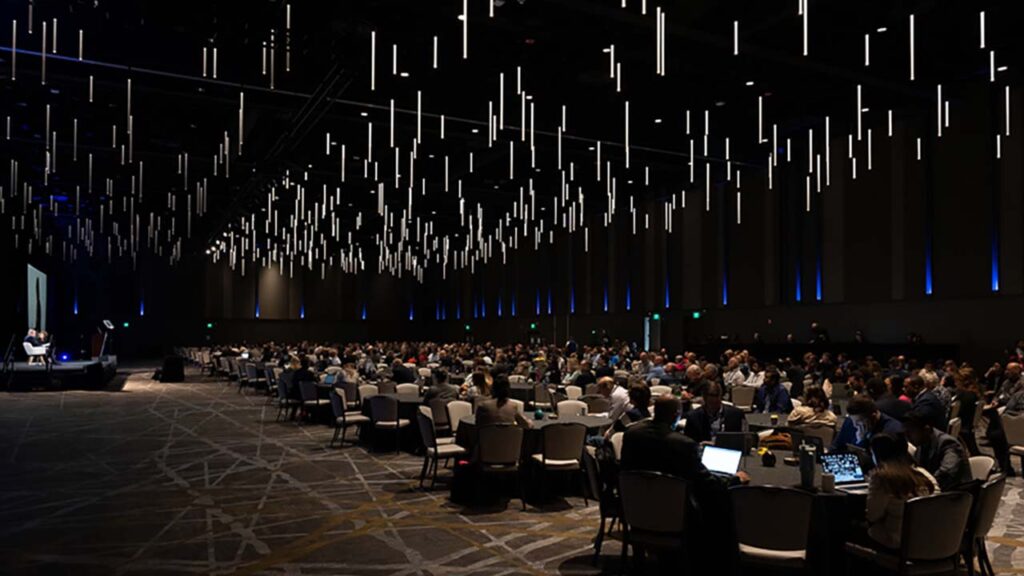Celebrating Women in STEM at ISSRDC 2023
This summer, as blockbuster films inspire women to pursue their dreams, female leaders in science, technology, engineering, and mathematics (STEM) played pivotal roles at the 12th annual International Space Station Research and Development Conference (ISSRDC). On Women’s Equality Day, the ISS National Laboratory honored the women who enriched the conference as keynote speakers, emcees, and panelists. Below, we highlight a few of the nearly two dozen women who showcased their leadership in STEM, discussing research and business in low Earth orbit (LEO).
Megan McArthur
Nasa Astronaut


Megan McArthur serves as the astronaut representative for the space station program at NASA’s Johnson Space Center and is the chief science officer at Space Center Houston. Having flown to the ISS as part of the Crew-2 mission in 2021, McArthur shared her excitement about participating in various research investigations during her time in space during her welcome speech on Day 1.
“While in space, I was doing real research for people on the ground. The researchers put their heart and souls into this, and I got to be a part of their team by being their hands and eyes onboard the space station.”
— Megan McArthur
Ezinne Uzo-Okoro
Assistant Director for Space Policy, White House Office of Science and Technology Policy


Ezinne Uzo-Okoro commenced Day 1 at ISSRDC by moderating a panel titled “Igniting Innovation to Accelerate Disease Research on the ISS.” Her work at the White House encompasses Earth observations, orbital debris, microgravity research, and more. The panel emphasized the ISS National Lab’s recent solicitation concerning cancer and other disease-related studies, where Uzo-Okoro discussed the significance of advancing research in cancer treatment.
“While cancer remains the second leading cause of death in the United States, significant progress has been made through this effort, and more needs to be done to ensure a diagnosis isn’t a death sentence, and we can prevent cancer before it starts.”
— Ezinne Uzo-Okoro
Donna Roberts
Deputy Chief Scientist, ISS National Laboratory


As the Deputy Chief Scientist, Donna Roberts helps set long-term research objectives for the ISS National Lab. With her background in radiology, Roberts moderated a panel discussion titled “Getting to the Heart of the Matter in LEO,” focusing on a study investigating microgravity’s impact on heart cells derived from stem cells. She emphasized the significance of conducting iterative research aboard the ISS to enhance scientific understanding.
“As investigators, that’s one thing we’re really looking for is the opportunity to fly multiple missions with rapid turnaround, and perhaps this is the way of the future.”
— Donna Roberts
Susan Margulies
Directorate for Engineering, U.S. National Science Foundation


Susan Margulies delivered a keynote on Day 2, highlighting the NSF’s long-standing support of fundamental research on the ISS. With a budget nearing $800 million, the NSF Engineering Directorate plays a crucial role in funding engineering research at academic institutions. Margulies acknowledged the ISS as a vital venue for transformative scientific exploration.
“On Earth, we have few opportunities to relieve the phenomenon of gravity, but only for a few seconds or minutes at best. The International Space Station gives us an opportunity to remove gravity’s effects for weeks at a time, which can provide deep insight into fundamental science processes taking place—this is hugely important.”
— Susan Margulies
Robyn Gatens
Director of the ISS, NASA


Robyn Gatens joined the discussion on “The Future of R&D in Low Earth Orbit,” where she highlighted the diverse voices in research and technology development. Leading strategy and stakeholder engagement for the ISS program at NASA, she noted that medical research on the ISS positively impacts patients on Earth.
“Dare we hope to say, someday, that we cured cancer through research on the International Space Station? I think we can already say that lives are being saved today that would not have been saved before if not for the research being done on station.”
— Robyn Gatens
Adele Luta
Exploration Extravehicular Activities Integration Manager, Oceaneering International


Adele Luta, the keynote speaker at the Women’s Networking Breakfast, drew comparisons between space exploration and ocean exploration, sharing her background as a physicist and her experience as a NASA flight controller. Her address focused on the importance of adopting an “and” mindset, which encourages openness to new opportunities and solutions.
“I would encourage you to embrace ‘AND’ when you are stuck and think about all of your tools and resources. Our culture, communication, and technology are changing rapidly—from my perspective, the ‘AND’ is more important than ever, and the ‘AND’ is where we will discover solutions to those really hard problems.” — Adele Luta
Empowering Future Generations in Space


On Day 3, ISSRDC introduced the future generation of space researchers with the announcement of the 2023 Genes in Space competition winner. Isabel Jiang, a high school student from Hillsborough, CA, crafted the winning project, exploring how latent viruses become reactive in space. Last year’s winner, Pristine Onuoha, participated in the conference to support this year’s finalists after witnessing her own project launched to the ISS.
Both Isabel and Pristine represent the promising future of women in STEM, proving that the sky is not the limit but just the beginning!


